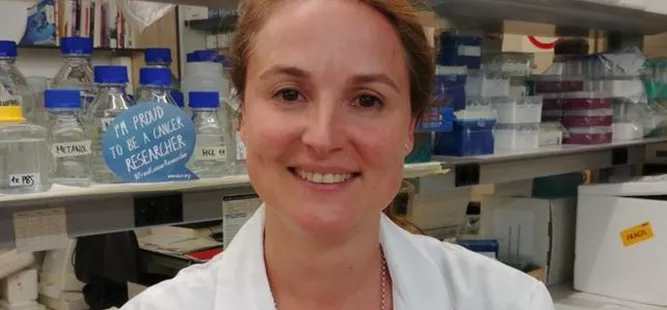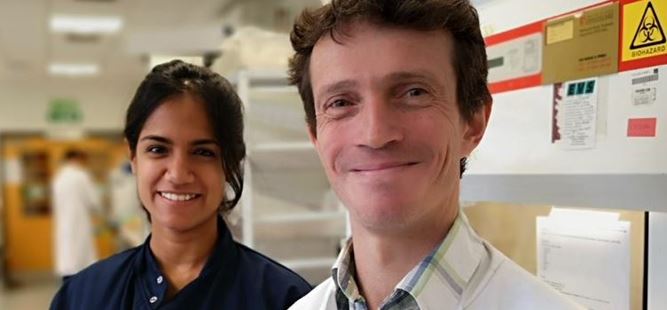A recent discovery could be a starting point for new pancreatic cancer treatments
18th November 2020
Pancreatic cancer has one of the worst survival rates of any cancer with only around 1 in 20 people surviving for a decade or more after their diagnosis. In the UK, over 10,000 people are diagnosed with pancreatic cancer each year and only 1 in 4 will survive for more than a year. But now, thanks to the kindness and generosity of supporters like you, a recent discovery could offer new hope for the future.
495,000
The number of people worldwide diagnosed with pancreatic cancer in 2020.
466,000
The number of people worldwide who died from pancreatic cancer in 2020.
<8%
Less than 8 in 100 people diagnosed with pancreatic cancer will survive for more than 5 years after their diagnosis.
The reason pancreatic cancer is so difficult to treat is that the tumours are often fibrotic, which means they develop extra connective tissue throughout the pancreas. This connective tissue aids the growth of pancreatic cancer and provides a protective barrier against drugs and the immune system.
This protective barrier is made up of a type of cell called a cancer-associated fibroblast (CAF), which interact with cancer cells to help them grow and survive. Thanks to your donations, researchers in the US have now discovered that a protein called Netrin-G1, previously thought to only be involved in the development of neurons in the brain, is also produced by CAFs and plays a major role in the development and growth of pancreatic cancer. Their findings demonstrate for the first time how the protein helps pancreatic cancer cells survive by protecting them from the immune system and supplying them with nutrients.
The research has also shown that an antibody that neutralises Netrin-G1 was able to stunt the progression of pancreatic tumours in mice, demonstrating the potential of this new route to developing new drugs.
This discovery could prove to be the starting point for developing new treatments for a type of cancer that desperately needs them. It couldn't have happened without you.
Dr Edna Cukierman, Associate Professor at Fox Chase Cancer Center in Philadelphia and Co-Director of the Marvin and Concetta Greenberg Pancreatic Cancer Institute, who led the study, said of the breakthrough:
“We saw that many pancreatic cancer patients express Netrin-G1 and that these patients tend to survive for a shorter time. So, in the future, detection of Netrin-G1 could be used to help diagnose patients. We also believe that limiting Netrin-G1 function could provide the starting point for the design of new treatments in a type of cancer that is in dire need of effective therapies.
We next plan to continue investigating the biology behind Netrin-G1 expression in CAFs, figure out a practical way to detect it in patients, and partner with industry to design Netrin-G1 blocking drugs. This way we hope that targeting Netrin-G1 could serve, one day, to treat pancreatic cancer patients."

It's amazing to see such great progress from a project which offers a starting point for the future development of treatments against a particularly deadly type of cancer. But these discoveries can't happen without you. Your kindness and generosity will help our scientists to continue finding new cures to save lives in the future.
Donate
Further reading

Hope for new pancreatic cancer treatments
New discovery paves the way to design new treatment combinations that could kill cancer cells while also making them more susceptible to chemotherapy.
03 March 2021

New discovery starts drug development for pancreatic cancer
Scientists have discovered several new compounds that inhibit a protein that is known to play a role in tumour progression and metastasis in pancreatic, as well as several other cancers.
13 August 2020

Disrupting tumour defences in pancreatic cancer
By understanding how healthy cells in and around the tumour support the growth of cancer, scientists hope to uncover new treatments for pancreatic cancer.
27 October 2020
